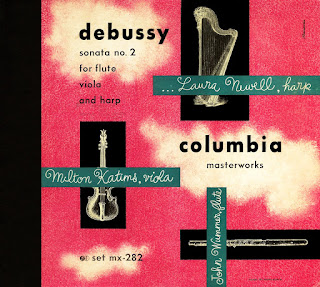 |
Cover by Al Hirschfeld
(restored by Peter Joelson) |
The greatest harmonica player of them all, Larry Adler, would have been 100 years old last February had he lived. (He died in August, 2001, aged 87.) Around the time that anniversary would have been celebrated, I was lucky enough to find this Decca set in a used record shop. Adler recorded copiously, but the vast majority of his recordings were British, for it was in Britain that he achieved his greatest fame. There were sixteen issued American Decca sides made during the 1940s, the last two of them on the very day before the 1948 Petrillo recording ban took effect. After that ban was over, he had been blacklisted for alleged Communist sympathies, and he moved to England permanently. Here are one-half of those sixteen sides:
Larry Adler and His Harmonica, Vol. 2:
Katscher: When Day is Done
Olshanetzky: My Little Town Belz
Londonderry Air
Adler: Beguine
Debussy: Clair de Lune
Dinicu-Heifetz: Hora Staccato
Enesco: Roumanian Rhapsody No. 1
Recorded 1945-47
Decca set DA-653, 4 10-inch 78-rpm records
Link (FLAC files, 81.97 MB)
Link (MP3 files, 46.53 MB)
Strictly speaking, the Debussy/Dinicu record doesn't belong to DA-653; the previous owner had substituted it, but I was glad to get it anyway. The Hora Staccato is a tour de force, as is the Enesco Roumanian Rhapsody. The latter was featured in the 1948 MGM musical "Three Daring Daughters" starring Jeannette MacDonald, José Iturbi and Jane Powell. In his entertaining 1984 memoirs, "It Ain't Necessarily So," Adler recounts how Iturbi almost cheated him out of the chance to work on the film:
"[In the film] I was to play Enesco's Roumanian Rhapsody in a Carnegie Hall setting, with Iturbi conducting a symphony orchestra. Before shooting I flew to Chicago for an engagement at the Chicago Theatre. When I returned I had a call from Abe Lastfogel [Adler's agent]. He told me that due to a set-designer's strike, they couldn't get the Carnegie Hall set built. Would I let [the film's producer Joe] Pasternak out of our deal? He'd put me in another film some other time. I could have insisted that I be paid - I had held the time free and signed a contract - but it didn't seem important enough to make it an issue, creating bad feeling and certainly ensuring that I'd never work at MGM again. So I agreed, the deal was off.
"That night Johnny Green rang me. Johnny, an old friend, was most famous as the composer of Body and Soul. He was in charge of music at MGM.
"'Larry', he said, it means my job if word of this gets out.' I promised secrecy.
"He told me that the set-designer story was phony. The set was up, they were shooting the number but without me. Instead of conducting the orchestra while I played, Iturbi would conduct from the piano while he played. And what would he be playing? Enesco's Roumanian Rhapsody. What a coincidence!
"'And Larry', said Johnny, 'he's using your arrangement!'
"Even for Hollywood this seemed to be carrying chutzpah to extremes. I phoned Lastfogel and, keeping Johnny's name out of it, told him what I'd learned. I said find out if the set is up; if it is, then is Iturbi doing a number and, if so, what number?
"Lastfogel called back.
"'You're back on the picture', he said. 'You don't know anything, you keep schtumm.'
"Next day Pasternak phoned. He was delighted, he said, that all the difficulties were ironed out, that I would be in the film after all.
"'Larry', he said, 'I've got a script problem and I need your advice. Could you come out to the studio today?
"I'm in the picture as a mouth-organist and suddenly I'm advising the producer on script problems. I drove out to the MGM studio.
"'Larry', said Pasternak, 'I've got to establish that José and Jeannette MacDonald are in love; there's only one logical place to establish it and that's during your number. Jeannette will be sitting in the audience and I want to show, with one look between them, that they're in love.'
"I had an idea what was coming.
"'Now, Larry', said Pasternak, and this time I could have written the script, 'if José is conducting the orchestra, his back is to the audience, right? And if his back is to the audience, he can't look at Jeannette. Ya with me?'
"Joe, I was way ahead of you.
"'And if he can't look at her, she can't look at him, right?'
"Right.
"'So, the way I worked it out, if José is at the piano, see, like he's playing a duet with you and conducting the orchestra at the same time, this way I can establish the look, the audience knows they love each other, you got it?'
"I got it. I also know I'm screwed.
"That's what we did, except that José had one more trick; he worked his sister, for God's sake, into the act. José Iturbi, Amparo Iturbi, and Friend. I was the friend. The number was lousy."
I've never seen the movie, so I can't agree or disagree with Adler's opinion, but the record certainly isn't lousy. Of course the Iturbis were Victor artists so they aren't on it - fortunately!






